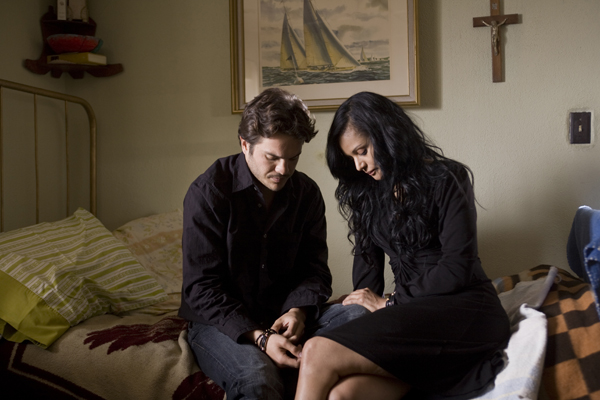|
Reviews of Recent Independent, Foreign, & Documentary Films in Theaters and DVD/Home Video

SPOKEN
WORD Spoken Word twists the ethnic-boy-who-made-good-by-leaving-his-traditional-culture-behind-to-return-home template. The rebel here is Latino, a poet, and his family’s home is in the beautiful high ridges of northern New Mexico, the first time director Victor Nunez has set a film outside his native Florida. In the opening montage of a poetry slam tour, success for charismatic Cruz Montoya (dynamic Mexican actor Kuno Becker) culminates in an acclaimed performance in San Francisco. By day, he teaches emotive creative writing to inner-city teens in Oakland, and has a loving, gorgeous artist girlfriend, with matching star tattoos. Then he gets The Call, so familiar in films these days—his estranged father is seriously ill. His girlfriend, of course, complains he won’t talk about his feelings about the bad times in his past. Instead, he communicates to the audience through his poetry, accompanied by brief evocations of his memories, which are more moving than the usual smarmy pop song links or crutch of voice-over narration. (The script is co-written by performance poet Joe Ray Sandoval, and these lines are mostly from his poems.) When Cruz returns home to the Sangre de Cristo Mountains at Thanksgiving, he clashes with his straight-laced, married-with-children brother and with his father, Cruz Senior (Rubén Blades, who adds subtlety to the dying proud patriarch role), who are both set against Cruz’s reconnection with the father-figure from his past, Emilio (Miguel Sandoval, relishing playing a kingpin). There’s also an undeveloped undercurrent about Emilio buying the Montoya family land. But Cruz Junior is soon back working at his old job managing the Santa Fe club where Emilio’s minions openly sell drugs. (This is not the quaint New Age Santa Fe of tourists.) Cruz is seen early on taking a cocktail of medications, and these turn out to be for bi-polar disorder. If his condition is not just symbolic, presumably he’s in his manic phase when he fills the clubs with revelers, besides getting drunk and high. His stay as a caregiver extends through the holidays, but he not only ignores his girlfriend’s calls and an offer to teach poetry at the community center, he can’t come up with lyrics to match the tracks an old friend has put down. His muse has left the building. The road
through the woods to Cruz Junior’s reconciliation with his family and
his art takes an All-American turn in his dad’s vintage Impala. It’s a
nice touch when Cruz Senior turns on the car radio and out comes the
1960’s hits of the late Chicano legend Freddy Fender. But the very
appealing actors, lovely landscape, and resonant music can’t quite make
up for the predictable family story and dialogue in a heartfelt film
that just doesn’t come up to the level of Nunez’s previous touching work
with similar themes, Ruby in
Paradise (1993) or
his most recent Coastlines.
Nora Lee Mandel
|

